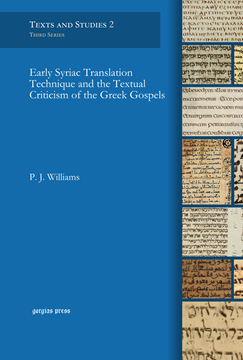P. J. Williams

pjw1004@cam.ac.uk
Early Syriac Translation Technique and the Textual Criticism of the Greek Gospels
Series: Texts and Studies (Third Series) 2
ISBN: 978-1-59333-096-5
Although scholars have often made inferences about the Greek texts that lay behind the Old Syriac and Peshitta versions of the Gospels, very few have ever attempted to formulate systematic rules for such inferences. This volume investigates a wide range of textual phenomena and formulates clear and simple rules for the use of Syriac texts as witnesses to the underlying Greek. It becomes possible to uncover errors that have accumulated during the evolution of the Greek New Testament textual apparatus. Williams argues these errors generally stem from the unjustified use of Syriac witnesses.
$170.00 (USD) $102.00 (USD)
Foundations for Syriac Lexicography II
Colloquia of the International Syriac Language Project
Edited by P. J. Williams; Managing Editor Beryl Turner
Series: Perspectives on Syriac Linguistics 3
ISBN: 978-1-60724-088-4
This volume is part of a series that addresses issues of Classical Syriac lexicography, and the lexicography of other ancient languages. The international team of authors invited to participate represents a wide range of disciplines and opens new horizons in lexical thinking. Essays in this volume discuss taxonomy, the Syriac passive participle, translating Greek verbs with alpha privatives into Syriac, the translation of Syriac particles, and the history of Syriac lexica. This book represents the forefront of Syriac lexical studies, and has much to offer those studying Greek and other Semitic languages as well.
$138.00 (USD) $82.80 (USD)


